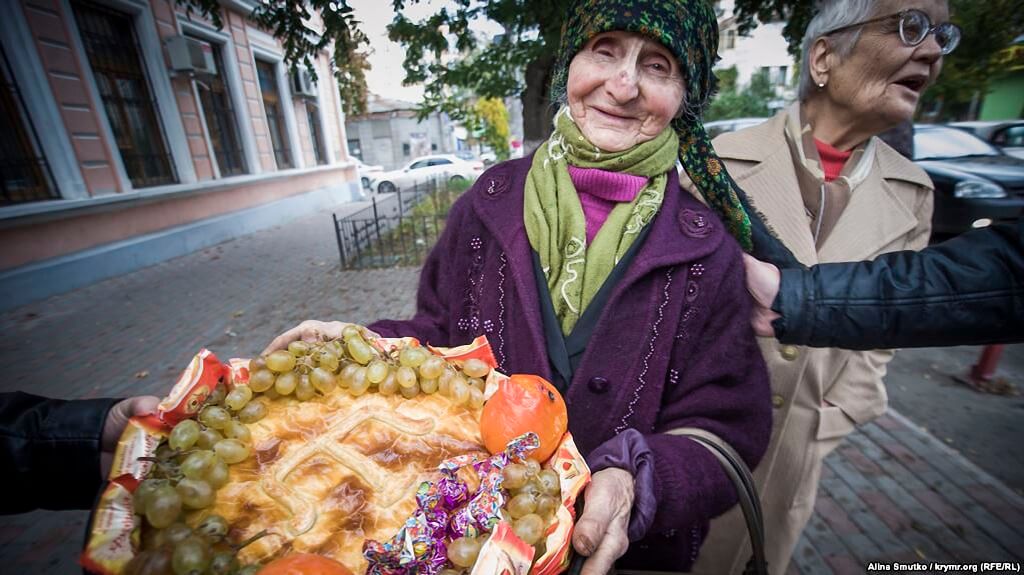NP-UN National Affairs Desk.
The Ukrainian Canadian Congress (UCC) has strongly condemned the latest round of political repressions perpetrated by the Russian occupation regime in Crimea against the indigenous Crimean Tatar and Ukrainian population.
“Earlier today, several Crimean Tatar activists had their homes searched and were illegally detained. The Government of Canada must move swiftly to implement sanctions against the Russian officials responsible for these attacks on the human rights of Ukrainian citizens,” stated the UCC in a media release, November 23.
“Today’s attack on Crimean Tatar activists by the Russian security services in occupied Crimea underscores the necessity for Canada to move immediately to implement wide-ranging sanctions against Russian officials responsible for these human rights violations,” added Paul Grod, National President of the UCC.
“The perpetrators of these crimes have names. They are judges, prosecutors, politicians, security services and officials of a criminal occupation regime that systematically violate the rights of Ukrainian citizens. Canada must make it clear that these violations cannot be committed by Russian authorities with impunity.”
A prominent elderly Crimean Tatar activist died after being caught up in an incident in which Russian security officers in Crimea detained several of her associates, reported RFE/RL.
Vedzhie Kashka, 82, became unwell and was taken away by ambulance in the Crimean city of Simferopol on November 23 after several fellow activists were detained by Russian officers on suspicion of extortion.
Speaking in Brussels after a meeting with European Council President Donald Tusk, Ukrainian President Petro Poroshenko said he had informed Tusk “about the terrible events that took place in Crimea today” and lauded Kashka’s “very important history of defending the interests of the Crimean Tatar people.”
Ukrainian Foreign Minister Pavlo Klimkin posted on Twitter that Kashka was a “heroic and courageous woman” and that her death was “another tragedy of despicable repressions Russia exerts in Crimea.”
Crimean Tatar activists Bekir Degermendzhi, Asan Chapukh, and Kyazim Ametov were detained in the incident, which took place in a cafe in the Crimean capital.
Russian state media quoted the Federal Security Service (FSB) branch in Crimea as saying that several members of the Mejlis, the Crimean Tatar self-governing body that has been outlawed by Russian authorities, were detained in Simferopol on suspicion of extorting $7,000 from a Turkish citizen.
However, Mejlis member Gayana Yuksel told journalists that the detainees were not members of the body.
Russia’s state-run RIA Novosti news agency, citing an unidentified law enforcement source, said that Kashka died due to “stress” and accused the suspects of “cynically” using her as a pawn in the alleged extortion plot.
But Crimean Tatar activist Nariman Dzhelalov told RFE/RL that the Turkish citizen had duped Kashka out of a large amount of money, and that the detained men were trying to convince him to return the sum.
The Turkish man “tried to get out of it, and the security services used the situation to apply pressure on this group of activists,” Dzhelalov said.
Kashka had been a prominent Crimean Tatar activist since the 1950s and was a colleague of Crimean Tatar leader Mustafa Dzhemilev and Soviet dissident Andrei Sakharov.
Her death triggered an outpouring of outrage and grief among fellow Crimean Tatars.
“They’ve come for our elders,” journalist Aidar Muzhdabayev wrote on Facebook, adding that it was “impossible to hold back tears.”
Muzhdabayev and others said Russian security officers had planned to detain the veteran activist as well before she fell ill. That could not be immediately confirmed, and Russian authorities did not immediately release an official statement on the matter.
Rights groups and Western governments have denounced what they call a persistent campaign of oppression targeting members of the indigenous Turkic-speaking Crimean Tatar minority and other citizens who opposed Russia’s annexation of the Black Sea peninsula from Ukraine in March 2014.
Human Rights Watch said in a report released November 14 that de facto Russian authorities in the region have “intensified persecution” of Crimean Tatars due to their opposition to the Russian takeover of their historic homeland, concluded the RFE/RL report.
In its report, Human Rights Watch stated, “Russian authorities in Crimea have intensified persecution of Crimean Tatars, under various pretexts and with the apparent goal of completely silencing dissent on the peninsula. […] Since Russia’s occupation began, Russian authorities and their proxies have subjected members of Crimean Tatar community and their supporters, including journalists, bloggers, activists, and others to harassment, intimidation, threats, intrusive and unlawful searches of their homes, physical attacks, and enforced disappearances. Complaints lodged with authorities are not investigated effectively. Russia has banned Crimean Tatar media and organizations that criticized Russia’s actions in Crimea, including disbanding and proscribing the Mejlis, the Crimean Tatar self-governing highest executive body.”
“The Ukrainian Canadian community extends its sincere condolences to the Crimean Tatar People on the terrible news of the death of Crimean Tatar activist Vedzhie Kashka. May Her Memory Be Eternal. Вічная Пам’ять,” stated the UCC
Over a month ago, S-226, the Justice for Victims of Corrupt Foreign Officials Act (Sergei Magnitsky Law) became the law of the land in Canada. The Act provides “for the taking of restrictive measures in respect of foreign nationals responsible for gross violations of internationally recognized human rights.” The law allows Canada to target foreign officials who are responsible for human rights abuses and corruption by implementing asset freezes and travel bans against them.
“The Government of Canada has at its disposal the tools to sanction Russian officials responsible for the violations of human rights of Ukrainian citizens. Over 40 Ukrainian citizens have been illegally deported to and imprisoned in Russia. A regime of terror has been instituted by Russia in occupied Crimea and the occupied parts of Donetsk and Luhansk oblasts in order to repress any opposition to the illegal occupation and to force the Crimean Tatars and Ukrainian population to leave Crimea,” stated the UCC.
Share on Social Media




































